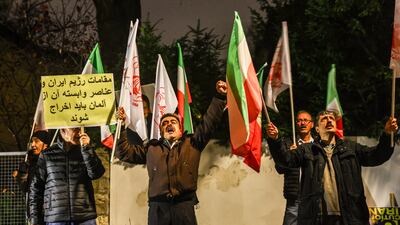Germany's closure of three Iranian consulates after the execution of dual national Jamshid Sharmahd leaves it with few further options to hit back without closing off diplomatic channels to Tehran, an expert says.
The German government on Friday urged its citizens to leave Iran to avoid suffering Mr Sharmahd's fate, which is being described in Germany as the killing of a hostage. However, embassy staff are not leaving Tehran, where Germany says it wants to continue supporting prisoners and monitoring the human rights situation.
Germany also maintains an interest in negotiating with Iran over its nuclear activities and discussing the conflicts in the Middle East, meaning it is unlikely to sever diplomatic ties altogether, said Diba Mirzaei, an Iran expert at the Giga Institute for Middle East Studies in Hamburg.
Foreign Minister Annalena Baerbock's decision to shut the three consulates in Hamburg, Frankfurt and Munich, leaving the embassy in Berlin open, is "more of a symbolic nature", she told The National. "It's more for the people in Germany that are outraged by Germany's incapacity to do much for Sharmahd.
The only other "plausible option" that Germany would be willing to pursue without severing diplomatic ties would be imposing "new sanctions, much heavier sanctions", she said. "But Germany is not doing it alone, it needs the EU, and currently at least I don't see that other European countries are supporting Germany in that. I think this was one of the reasons why Germany chose to close the consulates here."

Iran is already under heavy sanctions over a range of issues including its missile development, support for Russia and repression of regime critics and women's rights protesters. Germany, France and Britain recently announced they would end direct flights from Iran Air as part of the latest round of restrictions.
A key demand raised by Iran critics in Germany is to add the regime's Revolutionary Guards to an EU terrorist list. A court ruling that Iranian agents were behind a failed arson plot against a German synagogue has been presented in Brussels as a possible legal basis, but the proposal remains mired in EU procedures.
Acknowledging how many rounds have already been fired, Ulrich Lechte, a liberal Iran critic in the German parliament, said ministers should look at possible expulsions and "which further sanctions would be effective against the most sanctioned country".
Opposition leader Friedrich Merz called for Germany to expel Iran's ambassador and downgrade the post to a chargé d'affaires. But Ms Baerbock has told parliament she does not want to provoke Iran into closing the German embassy in Tehran, which she says would be doing the regime a favour.
Travel warning
A Foreign Ministry spokesman on Friday reiterated a travel warning calling on Germans to avoid travelling to Iran because of the risk of being held hostage. Official advice is to leave the country and for people still in the country to delete any political content from their phones.
"We have long had a travel warning for Iran and a request to Germans in Iran to leave the country because we saw from the Jamshid Sharmahd case that Iran is taking German citizens hostage," the spokesman said. "We want to spare other German citizens this fate."
Mr Sharmahd, 69, was convicted on charges of supporting terrorism and "corruption on Earth" after what Germany said was an unfair trial. His daughter Gazelle Sharmahd, who had campaigned for his release, suggested his execution was an act of retaliation for Israeli strikes against Iran.

Brushing off the criticism from Germany, Iran's Foreign Minister Abbas Araghchi said that "a German passport does not provide impunity to anyone, let alone a terrorist criminal". It accused Mr Sharmahd of being involved in plotting attacks from the US, including a 2008 mosque bombing in Iran.
Nonetheless, Iran has an interest in maintaining some diplomatic ties to show it is part of the international community and in keeping the door open for nuclear talks, Ms Mirzaei said. A nuclear deal between Iran and world powers has been on ice since 2018, when Donald Trump ended US involvement.
"Germany and the EU are still very much interested in renegotiating a deal. If Germany does not have any diplomatic relations with Iran this will not be feasible," Ms Mirzaei said. "Severing its diplomatic ties with Iran will be the last resort that Germany will go to. Right now, I just don't see that happening."
"In general when it comes to the situation in the Middle East, Germany knows that Iran plays a pivotal part when it comes to Hamas, to Hezbollah, so it needs to keep those channels open so that in the case that negotiations with Iran on any topic could emerge, they could still use the diplomatic relations with Iran.
"Germany actually until recently had quite a good reputation in Iranian politics, and was seen as more of a mediator than other countries. I think Germany could still use that to its advantage, and I think Germany knows that."


